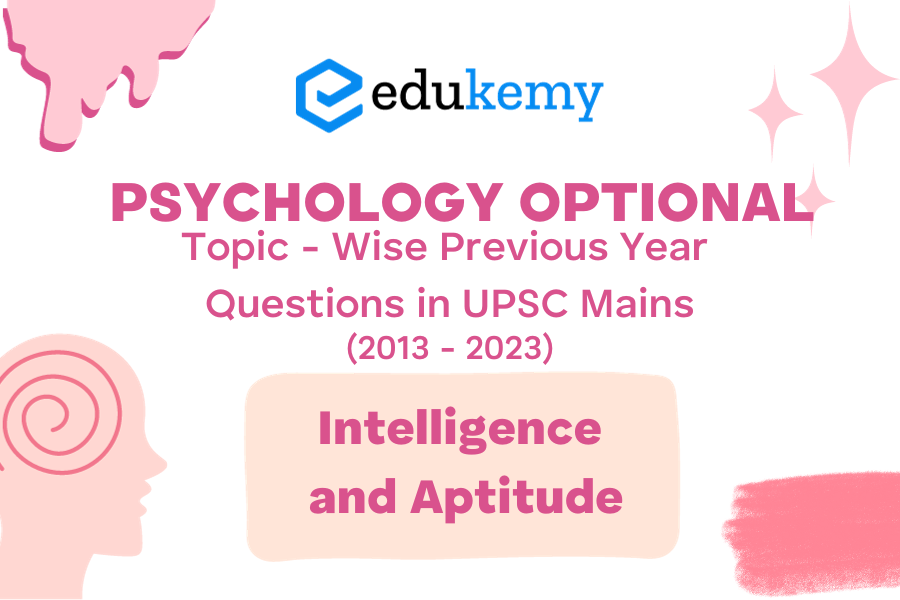
Exploring the intricate realm of optional subjects in the UPSC Mains examination, one area that consistently captivates the attention of aspirants is the Psychology optional. It’s a discipline that delves deep into the human mind, offering insights into the complexities of our thoughts, behaviors, and emotions. In this blog series, we embark on a journey through the past decade, from 2013 to 2023, to unravel the enigma of UPSC Psychology Optional with a focus on one of its pivotal topics – “Intelligence and Aptitude.” As we meticulously analyze and dissect previous year questions, we aim to provide a comprehensive understanding of this subject, helping aspirants prepare effectively for the examination.
Intelligence and Aptitude, as a topic, is a fascinating blend of psychology and critical thinking. It touches upon the assessment of human intellectual capabilities and their application in various real-life scenarios. This blog series will not only serve as a valuable resource for UPSC aspirants but also offer a glimpse into the dynamic nature of the examination, showcasing how the questions have evolved over the years. So, whether you’re a Psychology optional enthusiast or a curious mind eager to explore the world of intelligence and aptitude, join us on this insightful journey through the UPSC Mains’ Psychology Optional questions from 2013 to 2023.
Contents
- 1 Intelligence and Aptitude Psychology – Previous Year Questions (UPSC CSE Mains Psychology Optional)
- 2 Frequently Asked Questions (FAQs)
- 2.1 Q: Is Psychology a popular optional subject for UPSC Mains?
- 2.2 Q: What is the syllabus for the Psychology optional paper in UPSC Mains?
- 2.3 Q: How can I effectively prepare for the Psychology optional paper in UPSC Mains?
- 2.4 Q: What is the significance of previous year questions for UPSC Psychology optional?
- 2.5 Q: Are there any career prospects with a Psychology optional paper in UPSC?
- 3 In case you still have your doubts, contact us on 9811333901.
Intelligence and Aptitude Psychology – Previous Year Questions (UPSC CSE Mains Psychology Optional)
1. Discuss the constituents of emotional intelligence
2. Critically assess Gardner’s theory of multiple intelligence.
3. Distinguish between IQ and deviation IQ.
4. Discuss different the concept of N Ach and methods which have been used to measure it.
5. Compare the model of fluid and crystallized intelligence with the two factor theory of Spearman.
6. Describe and evaluate the model of intelligence proposed by J. P. Das.
7. Compare ‘multi-factor’ theory of intelligence with that of theory of ‘multiple intelligences’.
8. Critically evaluate the relationship between intelligence and creativity. Cite experimental evidences in support of your answer.
9. Explicate Sternberg’s view of intelligence and bring out its implications for schooling.
10. What is the purpose of item analysis ? How would you carry it out for a test of aptitude ?
11. What different types of norms will a psychologist need to develop a test of general mental ability for use in India ?
12. Evaluate the utility of J.P. Das’ model in understanding the concept of intelligence.
13. Discuss briefly the evolution of factor theory of intelligence in the works of Spearman, Thurstone and Guilford.
14. What is an aptitude ? Describe the various tests of aptitudes.
15. Explain the contribution of Salovey and Mayer with regard to the concept of emotional intelligence.
16. Describe the characteristics of Gardner’s theory of intelligence.
17. Give a comparative account of information processing models of intelligence proposed by Sternberg and J.P. Das.
18. Creative people usually have high IQ scores but those with highest IQ scores are not necessarily the most creative people. Explain.
19. According to Gardner’s theory, there is no one kind of general intelligence for ranking individuals. Explain
20. Can we determine a person’s academic performance based only on IQ score ? Explain.
21. Describe how J. P. Das’ theory is distinct from other theories of intelligence.
22. How is Gardner’s Theory of intelligence different from Spearman’s theory? Illustrate.
23. In what ways is deviation IQ different from traditional IQ? Discuss.
Frequently Asked Questions (FAQs)
Q: Is Psychology a popular optional subject for UPSC Mains?
A: Yes, Psychology is a relatively popular optional subject for the UPSC Mains examination. Many aspirants choose it due to its practical applications and its relevance in understanding human behavior, which can be beneficial in various administrative roles.
Q: What is the syllabus for the Psychology optional paper in UPSC Mains?
A: The UPSC paper comprises two papers, Paper-I and Paper-II. Paper-I covers topics such as the fundamentals of psychology, human development, and social psychology. Paper-II includes subjects like psychological testing, motivation, and environmental psychology, among others.
Q: How can I effectively prepare for the Psychology optional paper in UPSC Mains?
A: To prepare for the paper, it’s essential to understand the syllabus thoroughly. Reading standard textbooks, practicing previous year questions, and seeking guidance from experienced educators or mentors can greatly enhance your preparation.
Q: What is the significance of previous year questions for UPSC Psychology optional?
A: Previous year questions are crucial for preparation as they help candidates understand the exam’s pattern and focus areas. Analyzing these questions can guide you in tailoring your study strategy and mastering the subject.
Q: Are there any career prospects with a Psychology optional paper in UPSC?
A: Yes, there are career prospects beyond the UPSC examination with a background in this subject. The knowledge gained from studying psychology can be valuable in various administrative and policymaking roles, especially when dealing with issues related to human behavior, public health, education, and social welfare.
In case you still have your doubts, contact us on 9811333901.
For UPSC Prelims Resources, Click here
For Daily Updates and Study Material:
Join our Telegram Channel – Edukemy for IAS
- 1. Learn through Videos – here
- 2. Be Exam Ready by Practicing Daily MCQs – here
- 3. Daily Newsletter – Get all your Current Affairs Covered – here
- 4. Mains Answer Writing Practice – here

